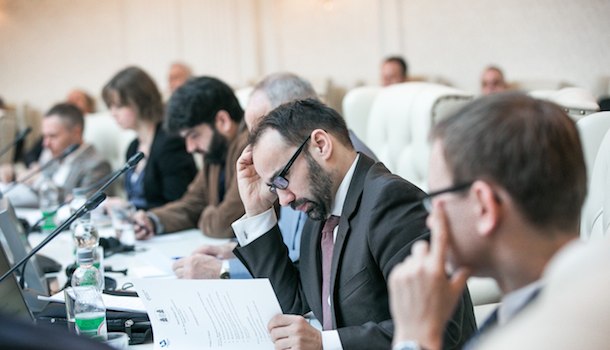While the second round of Minsk talks on Ukraine brought the heads of state from Ukraine, Russia, Germany and France to the table, there has been very little dialogue between these actors and other countries of the region to foster a common understanding. The organisers propose a non-governmental (Track-II) format to re-start the dialogue among analysts covering the region, bringing experts beyond the Eastern Partnership and the Eurasian Economic Union division line.
The Minsk Dialogue conference will gather leading experts from the European Union, Russia and the Eastern Partnership countries to discuss and develop viable ideas on how to minimize tensions in the ‘shared neighbourhood’, understand the difference between the genuine interests of countries and their rhetoric in order to produce concrete policy recommendations before the Riga Summit.
The event will take place two months before the Riga summit, to allow time to communicate outcomes to the public and policy-makers in the European Union, Russia and Eastern Partnership countries.
Track-II Diplomacy Format
The Minsk Dialogue Initiative aims to create a permanent Track-II (non-governmental) expert platform for holding regular conferences and promoting up-to-date policy advice. The conferences will be held under Chatham House Rule with a view to facilitating open exchange. In order to establish ties with Track-I diplomacy (inter-governmental), diplomats will be invited as observers.
Organisers
The Discussion and Analytical Society Liberal Club (Belarus) and the Ostrogorski Centre (UK-Belarus)
Objectives
- To facilitate inclusive expert dialogue at the Track-II level and beyond existing regional divides, which the Ukraine crisis has exposed.
- To forge pathways for cooperation in the ‘shared neighbourhood’ and for greater convergence between the two competing integration projects – the EU and the Eurasian Economic Union (EEU).
Venue
Minsk was chosen as venue for the Track-II platform due to its newly established status as a neutral ground for negotiations on resolving the Ukraine crisis. It has the best potential to gather experts from all countries in the region and is also uniquely placed to host discussions about EU-EEU relations, as it is simultaneously a founding member of both the EEU and the Eastern Partnership.
Expected Outcome
- A well-functioning inclusive network of influential region experts from EU and EaP countries and Russia.
- Regular non-papers with innovative policy advice for fostering cooperation across existing dividing lines in the ‘shared neighbourhood’.
Format
Two-day closed door discussions under the Chatham House Rule.
Participants
Up to 30 leading experts from the European Union, Russia and Eastern Partnership countries.
Programme
Thursday, 27 March
|
9.00-9.30 |
Registration |
|
9.30
9.30-10.00 |
Conference begins Welcoming remarks (Open to the press) Aliaksandr Mikhnevich – First Deputy Minister of Foreign Affairs, Belarus Yauheni Preiherman – Policy Director, Centre for Analytical Initiatives, Discussion and Analytical Society Liberal Club, Belarus Yaraslau Kryvoi – Founder, Ostrogorski Centre; Editor-in-Chief, Belarus Digest, UK-Belarus |
|
10.00-11.30 |
Session 1. Reviewing the European Neighbourhood Policy: What Reform Options are on the Table? (Open to the press) Speaker Maira Mora – Ambassador, Head of EU Delegation to the Republic of Belarus Discussants Arkady Moshes – Programme Director, EU Eastern Neighbourhood and Russia Programme, Finnish Institute of International Affairs, Finland Wojciech Konończuk – Head, Department for Ukraine, Belarus and Moldova, Centre for Eastern Studies, Poland Andrei Rusakovich – Chairman of the Board, Foreign Policy and Security Research Center, Belarus Andrei Skryba – Researcher, Centre for Comprehensive European and International Studies, Higher School of Economics, Russia Chair Yaraslau Kryvoi – Founder, Ostrogorski Centre; Editor-in-Chief, Belarus Digest, UK-Belarus |
|
11.30-12.00 |
Coffee break |
|
12.00-13.30 |
Session 2. What Caused the Regional Divide? Balázs Jarábik – Visiting Scholar, Carnegie Endowment for International Peace; Associate Fellow, Central European Policy Institute, Slovakia-Lithuania Rasim Musabekov – Milli Mejlis of the Republic of Azerbaijan, Azerbaijan Oleh Rybachuk – Chairman and Co-Founder, Centre UA, Ukraine Dmitry Suslov – Deputy Director, Centre for Comprehensive European and International Studies, Higher School of Economics, Russia Chair James Nixey – Head, Russia and Eurasia Programme, Chatham House, UK |
|
13.30-14.30 |
Lunch |
|
14.30-16.00 |
Session 3. The Eurasian Economic Union: Legitimate Grouping or Veil for Revanchism? Sławomir Dębski – Director, Centre for Polish-Russian Dialogue and Understanding, Poland Sergey Markedonov – Associate Professor, Russian State University for the Humanities, Russia Ian Bond – Director of Foreign Policy, Centre for European Reform, UK Mikayel Zolyan – Analyst, Regional Studies Centre, Armenia Chair Arkady Moshes – Programme Director, EU Eastern Neighbourhood and Russia Programme, Finnish Institute of International Affairs, Finland |
|
16.00-16.30 |
Coffee break |
|
16.30-18.00 |
Session 4. The Future of the Eastern Partnership: Is Reform Necessary? James Nixey – Head, Russia and Eurasia Programme, Chatham House, UK Giorgi Badridze – Senior Fellow, Georgian Foundation for Strategic and International Studies, Georgia Dzianis Melyantsou – Senior Analyst, Belarusian Institute for Strategic Studies, Lithuania-Belarus Hennadiy Maksak – President, Polissia Foundation of International and Regional Studies, Ukraine Chair Viktar Shadursky – Dean, Department of International Relations, Belarusian State University, Belarus |
Saturday, 28 March
|
9.30-11.00 |
Session 5. The European Union and the Eurasian Economic Union: Looking for Common Denominators Sergey Utkin – Head, Department of Strategic Assessment, Centre for Situation Analysis, Russian Academy of Sciences, Russia Vladimir Fesenko – Chairman of Board, PENTA Centre, Ukraine Jacek Giedrojć – Founding Partner, Warsaw Equity Group; President, Foundation for Liberal Education, Poland Victoria Bucataru – Research and Programs Director, Foreign Policy Association of Moldova, Moldova Chair Sławomir Dębski – Director, Centre for Polish-Russian Dialogue and Understanding, Poland |
|
11.00-11.30 |
Coffee break |
|
11.30-13.00 |
Session 6. Round Table: The Minsk Dialogue Network: Ideas for Future Cooperation Chair Yauheni Preiherman – Policy Director, Centre for Analytical Initiatives, Discussion and Analytical Society Liberal Club, Belarus Conference adjourns |


